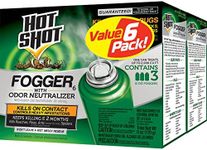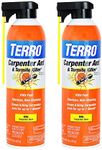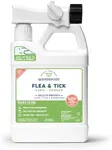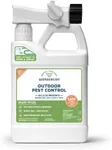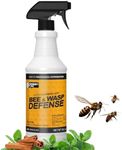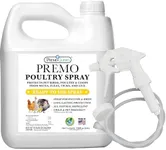Buying Guide for the Best Ant Sprays
Choosing the right ant spray can be a bit overwhelming given the variety of products available on the market. The key to making the best choice is understanding your specific needs and the different features of ant sprays. Here are some important specifications to consider when selecting an ant spray, along with explanations to help you make an informed decision.Active IngredientsThe active ingredients in an ant spray determine its effectiveness and safety. Common active ingredients include pyrethroids, fipronil, and essential oils. Pyrethroids are synthetic chemicals that are effective but can be harmful to pets and humans if not used properly. Fipronil is another potent chemical that is effective but should be used with caution. Essential oils like peppermint or clove oil are natural alternatives that are safer for use around children and pets but may not be as effective for severe infestations. Choose an active ingredient based on the severity of your ant problem and the safety requirements of your household.
Residual EffectThe residual effect refers to how long the spray continues to kill ants after application. Some sprays offer immediate results but have a short residual effect, meaning they need to be reapplied frequently. Others provide long-lasting protection, sometimes up to several weeks. If you are dealing with a severe infestation, a spray with a longer residual effect might be more effective. For occasional ant problems, a spray with a shorter residual effect may suffice.
Application MethodAnt sprays come in various application methods, including aerosol sprays, pump sprays, and foam sprays. Aerosol sprays are easy to use and can cover large areas quickly, making them ideal for outdoor use or large indoor spaces. Pump sprays offer more control and are better for targeted applications, such as cracks and crevices. Foam sprays expand to fill gaps and are useful for hard-to-reach areas. Consider where and how you will be using the spray to determine the best application method for your needs.
SafetySafety is a crucial factor, especially if you have children, pets, or sensitive individuals in your household. Some ant sprays contain harsh chemicals that can be harmful if inhaled or ingested. Look for products that are labeled as safe for use around children and pets. Natural or organic sprays are generally safer but may require more frequent application. Always follow the manufacturer's instructions for safe use and storage.
OdorThe odor of an ant spray can be a significant consideration, especially for indoor use. Some sprays have a strong chemical smell that can be unpleasant and linger for a long time. Others are formulated to be odorless or have a mild, pleasant scent. If you are sensitive to smells or plan to use the spray in living areas, opt for a low-odor or odorless product.
Effectiveness Against Different Ant SpeciesDifferent ant species may require different treatments. Some sprays are formulated to be effective against a wide range of ant species, while others target specific types. If you know the type of ants you are dealing with, choose a spray that is specifically designed to combat that species. For general ant problems, a broad-spectrum spray may be more convenient.
